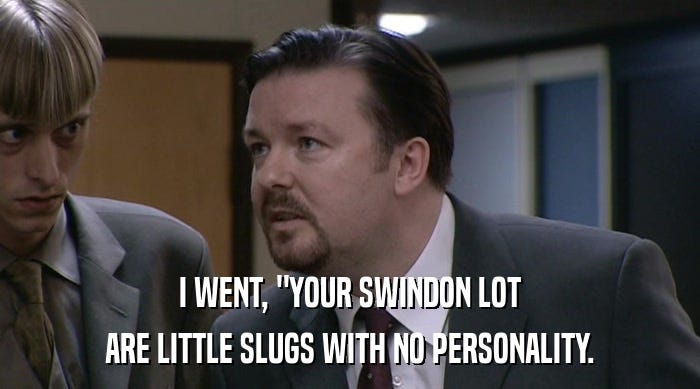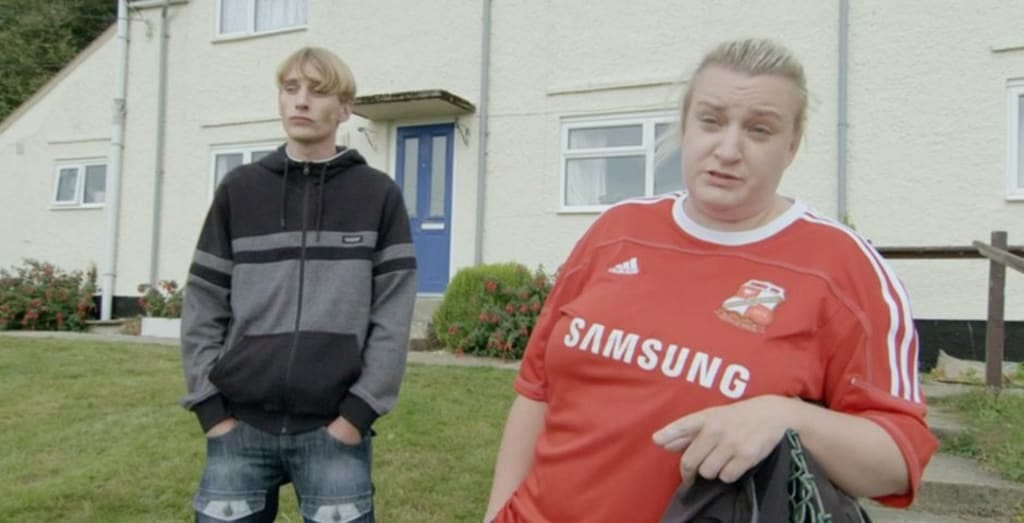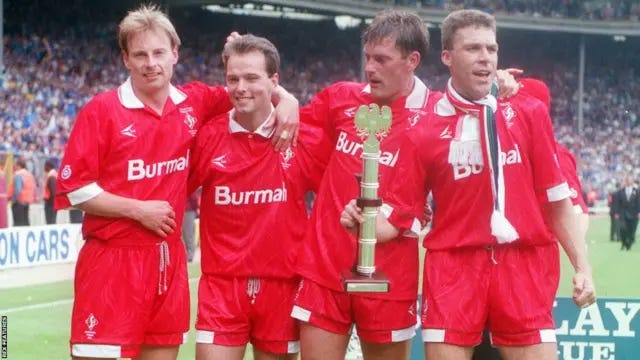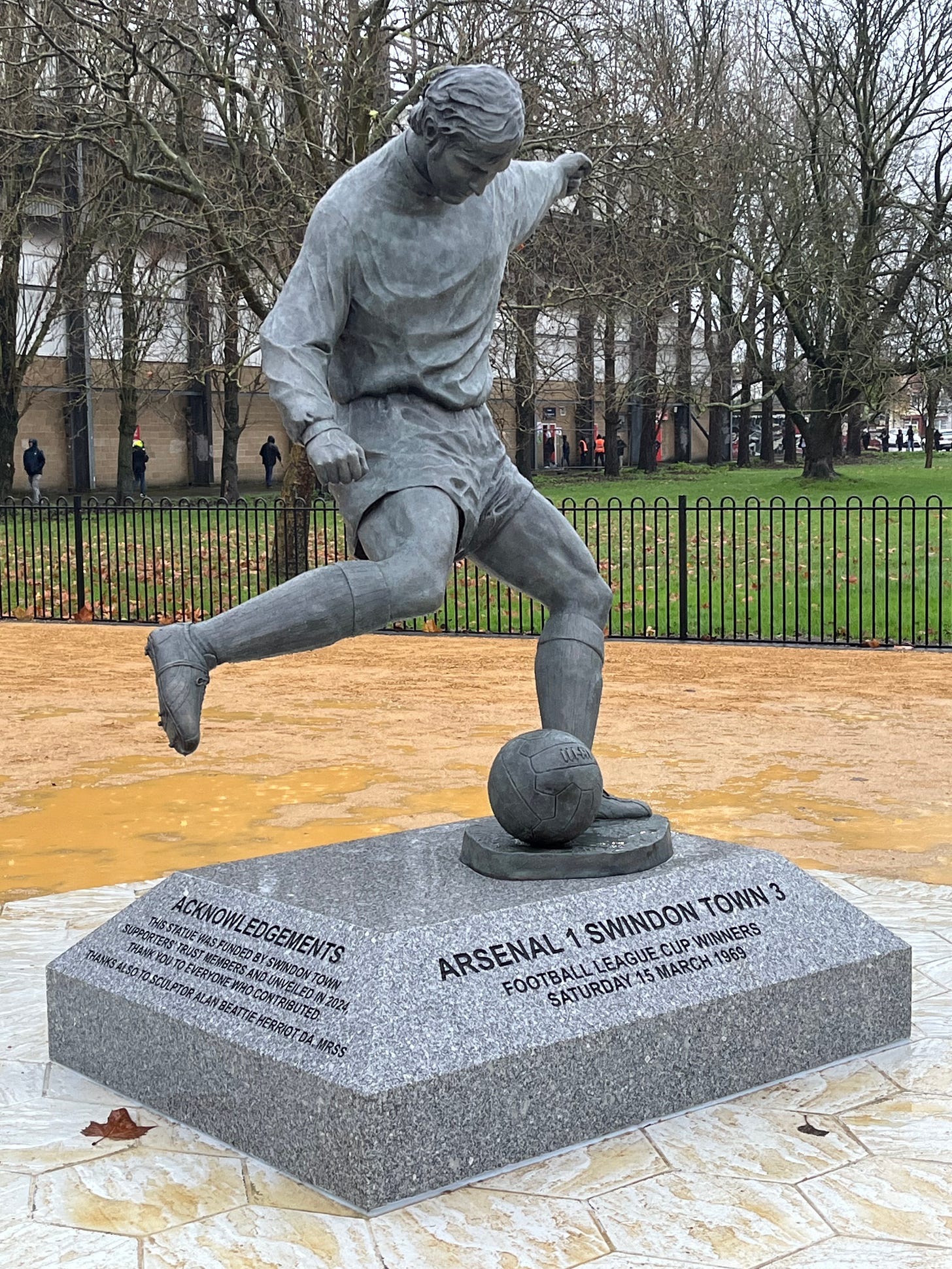For a sleepy, unassuming and unremarkable town, Swindon does seem to be over-represented in the world of comedy.
Mark Lamarr, who grew up in the Park South area of the town, frequently used Swindon as a comedic punchbag during his 1990s heyday. Guardian football cartoonist David Squires often manages to work in references to his (and my) beloved football club, Swindon Town. Another supporter of the team is Ivo Graham, whose recent tour was peppered with self-deprecating gags about the painful experience of being a Town fan. Perhaps most famously, Daisy May Cooper’s character in This Country is almost always wearing a Swindon shirt, her bedroom wall adorned with Town memorabilia.
I don’t think the prevalence of Swindon in comedy circles is a coincidence. Maybe the existential boredom and nihilistic despair of growing up in and around Swindon teaches you to be funny. Like Slough, or Staines, or Grimsby, or Skegness, it’s a joke of a town, the ending to a gag. It is the location of the “other” branch in The Office.
“Second prize in the competition is a two week holiday to Swindon; first prize is a week’s holiday to Swindon”. It’s that sort of town. You tend to develop a sense of humour when everyone thinks your hometown is a dump.
We Swindonians (or “Moonrakers”) know it is a dump, of course, but it is our dump, and you’ll forgive us if we sometimes get defensive about it.
Nobody would claim Swindon is a beautiful place. It doesn’t have a long and rich history; it was a small market town until Isambard Kingdom Brunel rocked up with the Great Western Railway in the 1840s. Swindon is a product of the Industrial Revolution, a working-class town which has weathered deindustrialisation better than most.
So there are no charming old buildings or landmarks as you might find in Salisbury or Chester or York. The town centre is hollowed-out and miserable, the air sucked out of it by soulless out-of-town developments. We can at least say we are home to the UK Roundabout of the Year (you’ll never sing that).
In his English Journey in 1933, JB Priestley described Swindon as a small industrial town in which you can work but you cannot really play. I did have some really fun times growing up in the town’s punk scene in the late 1990s, but despite that it is fair to say that ninety years after Priestley’s visit, not much has changed.
Then there is Swindon Town FC.
“The Robins” have been a member of the Football League ever since it expanded to four divisions in 1920, but this season increasingly looks like being the year where we lose our league status.
As with the place itself, Town have had glory days. A 3-1 win against Arsenal at Wembley in the 1969 League Cup Final, our only major trophy. Wins against Juventus and Roma in subsequent European competitions. Glenn Hoddle taking us up to the Premier League in 1993 in the greatest game of football I will ever see.
Those days seem a long way away now. Fans can dispute exactly where the slide began, but, bar a couple of brief blips, the club has been on a downward spiral for at least twenty-five years.
Supporters have been let down by a long series of dodgy owners. In the last four years we have had eight different permanent managers. Players come and go at an alarming rate. It is difficult to feel any sense of continuity or commitment or loyalty to a group of people who have only been there for five minutes and don’t seem to have Swindon’s best interests at heart. The relationship between the supporters and the club has been non-existent for a long time. Crowds have fallen significantly this year.
We hired our current manager, Ian Holloway, this month. The previous guy was sacked after just thirteen games in charge. Holloway thinks part of the problem might be that the training ground is haunted. He’s a bit of a joker too. Perhaps he’ll fit in at Swindon.
On Saturday I sat in the wind and rain to see us lose 3-2 at home to Morecambe, the worst team in the division. For all his oddities and his media-friendly persona, I don’t see Ian Holloway saving us from falling out of the Football League after 105 years. Relegation will punch a huge hole in the town. The club might not even survive it.
Priestley also said of Swindon that “a town in which men have worked hard all day at their giant engines ought to be glittering and gay at night, if only for an hour or two. Those who want light, company, cheerful noise, gaiety, should have these things, for they have earned them”. The people of Swindon also deserve a football team which at least plays with a bit of heart and tries to do its best for the townspeople. It’s been a long while since we’ve had that.
Before the game on Saturday I went to see the statue of Don Rogers which has been recently unveiled outside the stadium. The statue depicts the moment Rogers scored the third goal in our Cup Final victory back in 1969. How far the club has fallen since then. How far the current custodians lag behind their predecessors.
For they should not just be here for a wage; they represent the shirt and the town. It can be hard to take pride in Swindon at times, but when the club does well, it lifts us all. Most of the time, national media outlets based in the big cities couldn’t care less about provincial towns; a football club is one of the few ways such places can attract the country’s attention.
Football clubs also give us a focal point for our community, a sense of shared identity. On Saturday I was at the County Ground with my father and two friends I went to school with. Swindon Town matters to us because it is an expression of us.
Swindon will never be comparable to Paris or Rome. Swindon Town will never play football like Liverpool or Barcelona. But both the town and the club mean something to a lot of people. These things may not be perfect but they are real and, through thick and thin, they are ours.
At least when Swindon Town are relegated we won’t be short of comedians to help us laugh in the face of adversity. We’ve got a sense of humour down our way. It’d just be a bit nicer if it didn’t always have to be of the gallows variety.





Feels like this season might be THE season, Rob. The squad, especially the defence, appears to be a mess. Sad times.
There was a decent Swindon Town FC fanzine called 'Hit The Bar' that I used to enjoy reading every now and again, back in the days of football fanzines, wish I still had all mine.